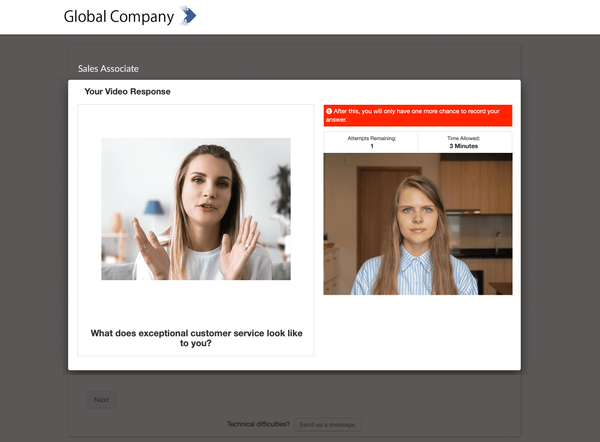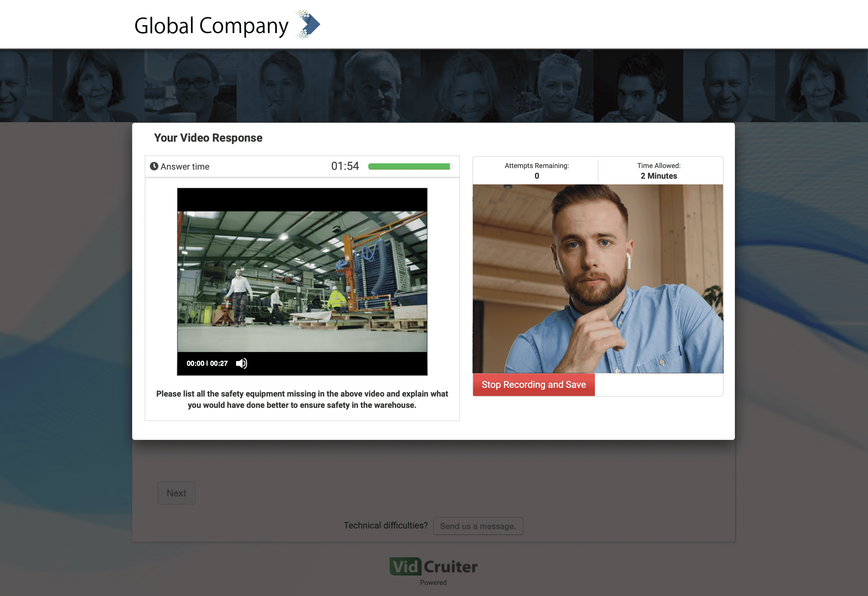Using Video for More Engaging, Predictive Interview Questions

Video interviews, especially in light of increased remote hiring, are helping hiring teams around the globe recruit talent—quickly and safely.
But video interviewing software is sometimes criticized because people mistakenly believe digital interviews are somehow “less than” in-person interviews.
Not only can video interviews mirror an in-person interview experience (after all, you’re still meeting with applicants face-to-face during live video interviewing), but it can be even better than in-person interviews.
How? Let’s dive in.
Video Opens Doors to New Types of Interview Questions
As an interviewer, you naturally want to learn about applicants’ job experience and education to evaluate if their abilities match those required for the position. Personality, work style, and soft skills are other important factors to consider when deciding whether or not someone would be a good fit for your company.
A one-dimensional resume can only get you so far toward that goal. Video allows you to both see and hear the candidate, deepening your understanding of the individual. But it doesn’t stop there.
Too often people miss out on the full potential of video . In the case of pre-recorded video interview software, HR professionals will input text-based questions for the interviewee to answer. But this cuts the power of video by half! The other half comes from adding video to your interview questions.
Go beyond text-based interview questions to include:
- Video interview questions, welcome messages, or company promotional videos
- Situational questions that simulate common work scenarios
Better Interview Questions, Better Candidate Experience
Although people are now much more comfortable meeting through video conferencing than they were in the past, it’s easy to lose a personal touch when using technology.
Posing your interview questions through video helps personalize the virtual interviewing experience, so it feels friendlier and more representative of your company culture. By doubling down on video in your interviewing efforts, you can help bridge the gap to create genuine connections to improve the candidate experience, even at a distance.
Promote Your Organization with Video Questions
Due to today’s candidate-driven job market, merely posting open positions on your website or job boards is no longer enough. Employers need to do a better job promoting the benefits of working for their organization.
One way to achieve this is to interview existing employees and record their answers! Set up a camera (most cell phones are sufficient) and ask current employees what they like about working there. This helps you—and more importantly, job applicants—hear first-hand perspectives about why your organization is a great place to work. It engages staff while attracting new talent. Win. Win.
You can also seamlessly incorporate promotional videos and welcome messages from the CEO or other company leaders into your video interview, further humanizing the experience.
Incorporate Real-World Situational Questions

You’re likely very familiar with behavioral questions, which are commonly used in interviews. Situational interviews are similar, but arguably more predictive of workplace success. They directly relate to the role you’re hiring for.
The difference between behavioral questions and situational questions lies in the timeline. Behavioral questions allow interviewers to gather insights into how an applicant handled a job-related situation in the past. But the past is the past. Situational questions allow interviewers to test—in a very practical way—how candidates would approach a future situation, such as one at your workplace should they get the job.
Situational interviews are common hypothetical questions that may present themselves in a typical day of work, communicated via video to the applicant. They can describe challenging but realistic incidents to uncover how candidates would handle them.
Example Situational Interview Questions
Here are some examples of situational interview questions, which of course differ depending on the job position. Use them as inspiration for your own!
Customer Service Representative
During their video interview, have the job applicant watch a fictional video (or audio recording) of a customer who’s angry about something that wasn’t the company’s fault. The candidate must then respond via recorded video, allowing you to gauge the candidate’s conflict resolution and customer service skills.
Administrative Assistant
Have the applicant watch a short POV video of the phone ringing, a customer walking into the office, and a co-worker asking for help with photocopying. In the subsequent video response, have the candidate walk through how they’d manage the competing demands for their attention.
Waiter/Waitress
Have the applicant watch a video of a family ordering a meal at a restaurant. Throw in some special request curveballs (like salad dressing on the side) or a last-second change to someone’s order. Then, test how well the candidate paid attention. Ask the candidate to identify who ordered what. You may also want to ask if they should be asking anything (perhaps for ID if someone ordered an alcoholic drink and they look underage).
Sports Professional
This example applies to any kind of sports recruitment, but other industries as well. In the case of golf, have the applicant watch a pre-recorded video of someone putting on an actual green. Ask them to identify what the player is doing wrong and ways to improve their putting stroke. This is also one of the most effective ways to scout athletes, coaches and officials.
The Benefits of Situational Video Interview Questions
The value of situational questions has clearly resonated with recruiters, which explains why they’re becoming more common. But video adds new depth to situational questions—providing hiring teams with more insight to predict on-the-job performance through simulations.
Situational interview questions are one of the most pragmatic ways to test how an applicant would perform on the job. They help hiring teams infer how candidates would handle the job for which they’re applying and force the applicant to seriously think about what’s being asked of them as an employee if they’re hired. Since these are not basic interview questions that the applicant can prepare an answer in advance (or perhaps memorize a favorable response), they also show how people think on their feet.
By Asking the Right Questions, You’ll Find the Right Hire
Video is a powerful tool for creative recruitment that resonates with real audiences. It’s a sure-fire way to improve your hiring efforts, allowing you to create more engaging interview questions that encourage candidates to put their best foot forward.
*Note: these questions are provided for example purposes only. They are not meant to be verbatim advice on what to ask during an interview. Please seek independent legal advice as to whether these questions work in your jurisdiction.
Navigating bias in your job search
What to do if you encounter LGBTQ+ and gender-related bias As you work towards your goal of nailing that next interview to land your dream job, you have likely had a range of exper...
Top Recruitment Blogs 2026
We live in an era where we’re constantly on the internet, either by using our smartphones or in front of a computer. As a result, human resource professionals have a wide range of ...
Unlock the Power of Networking: How to Build Meaningful Connections
Building a strong professional network can be the key to unlocking valuable opportunities and advancing your career. The question is, where do you start? For students and early-car...



